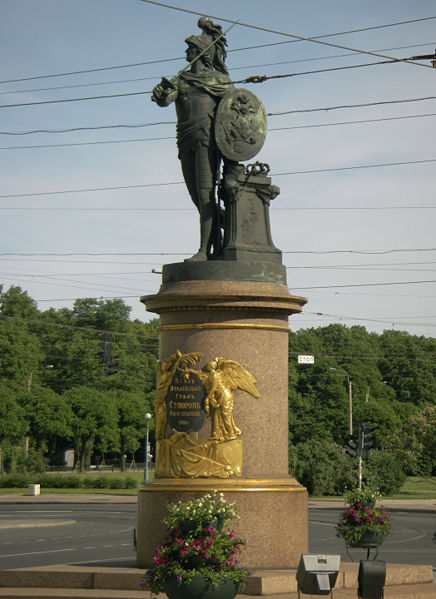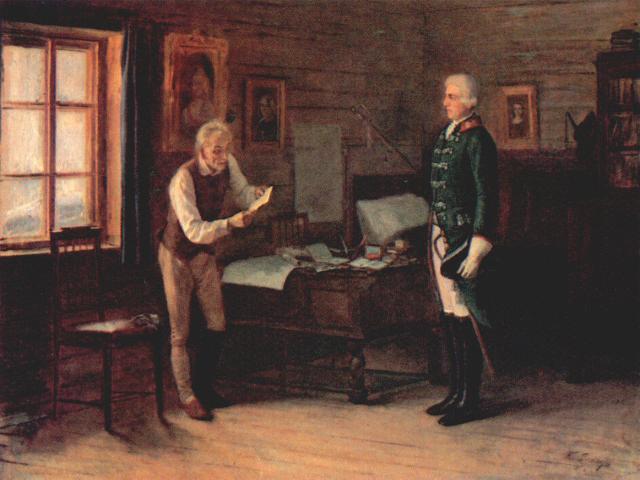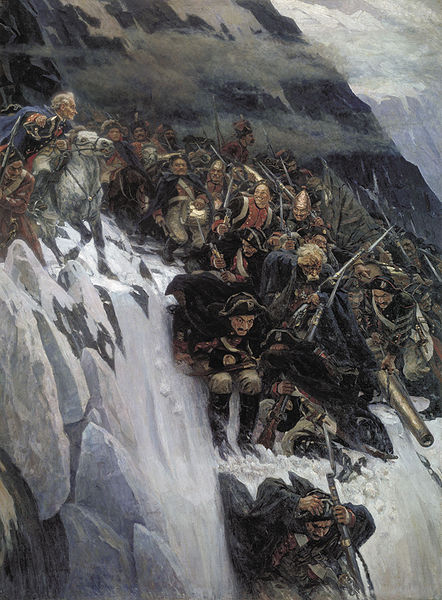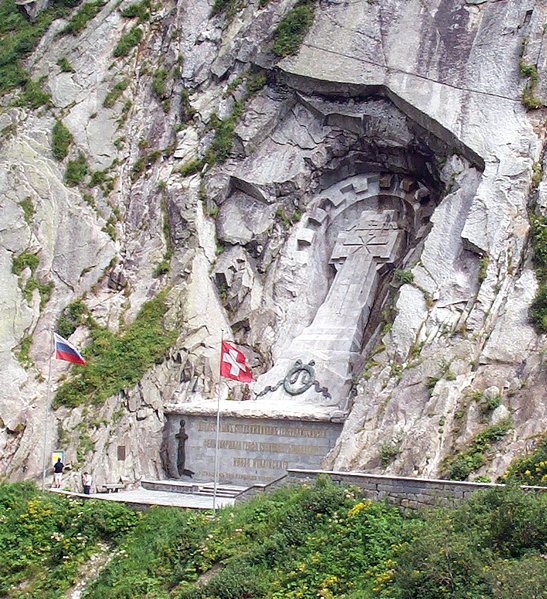<Back to Index>
- Philosopher Baruch de Spinoza, 1632
- Painter Henri Marie Raymond de Toulouse Lautrec Monfa, 1864
- Generalissimo of the Russian Empire Alexander Vasilyevich Suvorov, 1729
PAGE SPONSOR
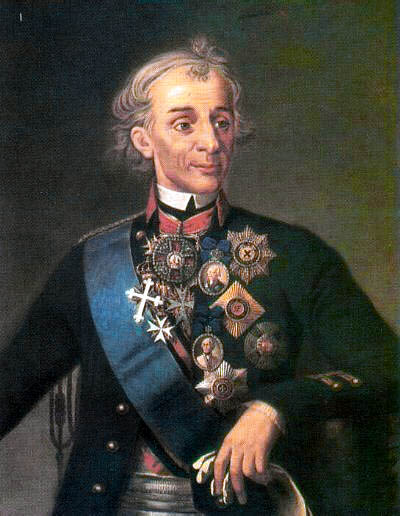
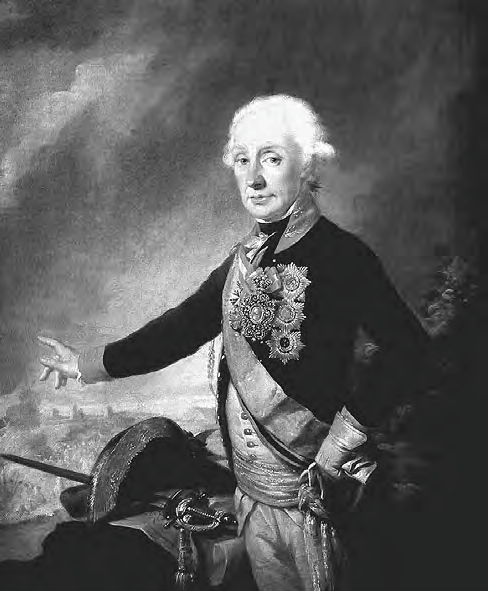
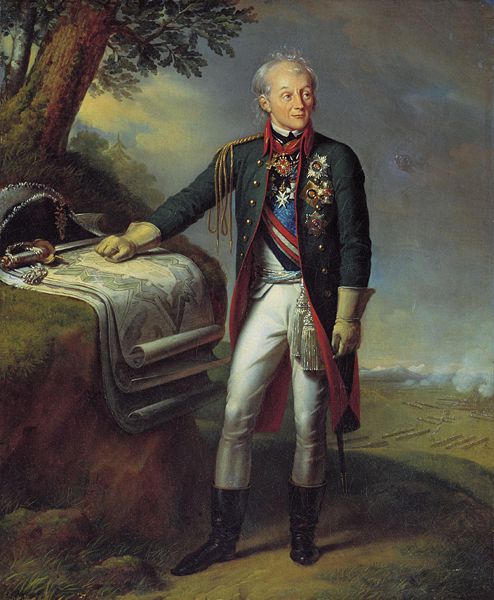
Alexander Vasilyevich Suvorov (Russian: Алекса́ндр Васи́льевич Суво́ров) Count Suvorov of Rymnik, Prince in Italy, Count of the Holy Roman Empire (граф Рымникский, князь Италийский) (24 November [O.S. 13 November] 1729 – 18 May [O.S. 6 May] 1800), was the fourth and last generalissimo of the Russian Empire.
One
of the few great generals in history who never lost a battle along with
the likes of Alexander the Great and Genghis Khan, he was famed for his
military manual The Science of Victory and
noted for the sayings "What is difficult in training will become easy
in a battle", "The bullet is a fool, the bayonet is a fine chap",
"Perish yourself but rescue your comrade!". He taught his soldiers to
attack instantly and decisively: "attack with the cold steel – push hard
with the bayonet!" His soldiers adored him. He joked with the men,
called the common soldiers 'brother', and shrewdly presented the
results of detailed planning and careful strategy as the work of
inspiration. Suvorov was born into a noble family originating from Novgorod at the Moscow mansion of his maternal grandfather Fedosey Manukov, a landowner from Oryol gubernia and an official of Peter I. His family had emigrated from Sweden in 1622. His father, Vasiliy Suvorov, was a general, and was credited with translating Vauban's works into Russian. As
a boy, Alexander, (nicknamed Sasha or Sandy) was a sickly child and his
father assumed he would work in civil service as an adult. However, he
learned to read French, German, Polish, and Italian, and devoted
himself to intense study of several military authors including Plutarch, Quintus Curtius, Cornelius Nepos, Julius Caesar, and Charles XII.
His physical ailments he attempted to remedy through rigorous exercise
and exposure to hardship. His father, however, insisted that he was not
fit for the military. When Alexander was 12, General Gannibal,
who lived in the neighborhood, overheard his father complaining about
Alexander, and asked to speak to the child. Gannibal was so impressed
with the boy that he persuaded the father to allow him to pursue the
career of his choice. Suvorov entered the army at age 17 as a private, served against the Swedes during the war in Finland and against the Prussians during the Seven Years' War (1756–1763). After repeatedly distinguishing himself in battle Suvorov became a colonel in 1762, aged around 33. Suvorov next served in Poland during the Confederation of Bar, dispersed the Polish forces under Pułaski, captured Kraków (1768) paving the way for the first partition of Poland between Austria, Prussia and Russia, and reached the rank of major-general. The Russo-Turkish War of 1768–1774 saw his first campaigns against the Turks in 1773–1774, and particularly in the Battle of Kozluca, he laid the foundations of his reputation. In 1775, Suvorov was dispatched to suppress the rebellion of Pugachev, who claimed to be the assassinated Tsar Peter III,
but arrived at the scene only in time to conduct the first
interrogation of the rebel leader, who had been betrayed by his fellow Cossacks and was eventually beheaded in Moscow. From 1777 to 1783 Suvorov served in the Crimea and in the Caucasus, becoming a lieutenant-general in 1780, and general of infantry in 1783, upon completion of his tour of duty there. From 1787 to 1791 he again fought the Turks during the Russo-Turkish War of 1787–1792 and won many victories; he was wounded twice at Kinburn (1787), took part in the siege of Ochakov, and in 1788 won two great victories at Focşani and by the river Rimnik. In both these battles an Austrian corps under Prince Josias of Saxe-Coburg participated, but at the Battle of Rymnik Suvorov was in command of the whole allied forces. For the latter victory, Catherine the Great made Suvorov a count with the name "Rimniksky" in addition to his own name, and the Emperor Joseph II made him a count of the Holy Roman Empire. On 22 December 1790 Suvorov successfully stormed the reputedly impenetrable fortress of Ismail in Bessarabia.
Turkish forces inside the fortress had the orders to stand their ground
to the end and haughtily declined the Russian ultimatum. Their defeat
was seen as a major catastrophe in the Ottoman empire, but in Russia it was glorified in the first national anthem, Let the thunder of victory sound! Suvorov announced the capture of Ismail in 1791 to the Tsarina Catherine in a doggerel couplet, after the assault had been pressed from house to house, room to room, and nearly every Muslim man,
woman, and child in the city had been killed in three days of
uncontrolled massacre, 40,000 Turks dead, a few hundred taken into
captivity. For all his bluffness, Suvorov later told an English traveller that when the massacre was over he went back to his tent and wept. Immediately
after the peace with the Ottoman Empire was signed, Suvorov was again
transferred to Poland, where he assumed the command of one of the corps
and took part in the Battle of Maciejowice, in which he captured the Polish commander-in-chief Tadeusz Kościuszko. On November 4, 1794, Suvorov's forces stormed Warsaw and captured Praga, one of its boroughs. The massacre of approximately 20,000 civilians in Praga broke the spirits of the defenders and soon put an end to the Kościuszko Uprising. According to some sources the massacre was the deed of Cossacks who
were semi-independent and were not directly subordinate to Suvorov. The
Russian general was supposedly trying to stop the massacre and even
went to the extent of ordering the destruction of the bridge to Warsaw
over the Vistula river with the purpose of preventing the spread of violence to Warsaw from its suburb. Other historians dispute this, but most sources make no reference to Suvorov either deliberately encouraging or attempting to prevent the massacre.
Suvorov nonetheless allowed his troops to loot the city for a much
longer period than was usually accepted, which might have been seen by
some, particularly the unruly Cossacks, as a green light to do whatever they wanted. Suvorov sent a report to his sovereign consisting of only three words: "Hurrah, Warsaw's ours!" (Ура, Варшава наша!). Catherine replied in two words: "Hurrah, Fieldmarshall!" (rus.Ура, фельдмаршал! — that is, awarding him this title). The newly-appointed field marshal remained
in Poland until 1795, when he returned to Saint Petersburg. But his
sovereign and friend Catherine died in 1796, and her son and successor Paul I dismissed the veteran in disgrace. Suvorov spent the next few years in retirement on his estate Konchanskoe near Borovichi.
He criticised the new military tactics and dress introduced by the
emperor, and some of his caustic verse reached the ears of Paul. His
conduct therefore came under surveillance and his correspondence with
his wife, who had remained at Moscow — for his marriage relations had not
been happy — was tampered with. It
is recorded that on Sundays he tolled the bell for church and sang
among the rustics in the village choir. On week days he worked among
them in a smock-frock. However, in February 1799 Paul summoned him to take the field again, this time against the French Revolutionary armies in Italy. The campaign opened with a series of Suvorov's victories (Cassano d'Adda, Trebbia, and Novi). French troops were driven from Italy, save for a handful in the Maritime Alps and around Genoa. Suvorov himself gained the rank of "prince of the House of Savoy" from the king of Sardinia. But the later events of the eventful year went uniformly against the Russians. General Korsakov's force was defeated by Masséna at Zürich.
Betrayed by the Austrians, the old field marshal, seeking to make his
way over the Swiss passes to the Upper Rhine, had to retreat to Vorarlberg,
where the army, much shattered and almost destitute of horses and
artillery, went into winter quarters. When Suvorov battled his way
through the snow-capped Alps his army was checked but never defeated. For this marvel of strategic retreat, unheard of since the time of Hannibal, Suvorov became the fourth generalissimo of Russia. He was officially promised a military triumph in Russia but court intrigues led Emperor Paul to cancel the ceremony. Early
in 1800 Suvorov returned to Saint Petersburg. Paul refused to give him
an audience, and, worn out and ill, the old veteran died a few days
afterwards on 18 May 1800, at Saint Petersburg. Lord Whitworth, the British ambassador, and the poet Gavrila Derzhavin were the only persons of distinction present at the funeral. Suvorov lies buried in the church of the Annunciation in the Alexander Nevsky Monastery,
the simple inscription on his grave stating, according to his own
direction, "Here lies Suvorov". But within a year of his death the tsar Alexander I erected a statue to his memory in the Field of Mars. Suvorov's
full name and titles (according to Russian pronunciation), ranks and
awards are the following: Aleksandr Vasiliyevich Suvorov, Prince of
Italy, Count of Rimnik, Count of the Holy Roman Empire, Prince of
Sardinia, Generalissimo of Russia's Ground and Naval forces, Field
Marshal of the Austrian and Sardinian armies; seriously wounded six times, he was the recipient of the Order of St. Andrew the First Called Apostle, Order of St. George the Triumphant First Class, Order of St. Vladimir First Class, Order of St. Alexander Nevsky, Order of St. Anna First Class, Grand Cross of the Order of St. John of Jerusalem,
(Austria) Order of Maria Teresa First Class, (Prussia) Order of the
Black Eagle, Order of the Red Eagle, the Pour le Merite, (Sardinia)
Order of the Revered Saints Maurice and Lazarus, (Bavaria) Order of St.
Gubert, the Golden Lionness, (France) United Orders of the Carmelite
Virgin Mary and St. Lazarus, (Poland) Order of the White Eagle, the Order of Saint Stanislaus. Suvorov's son, Arkadi Suvorov,
(1783 – 1811) served as a general officer in the Russian army during the
Napoleonic and Turkish wars of the early 19th century, and drowned in
the same river Rimnik that had brought his father so much fame. His
grandson Alexander Arkadievich (1804 – 1882) served as Governor General of Riga in 1848–61 and Saint Petersburg in 1861–66. The
Russians long cherished the memory of Suvorov. A great captain, viewed
from the standpoint of any age of military history, he functions
specially as the great captain of the Russian nation, for the character
of his leadership responded to the character of the Russian soldier. In an age when war had become an act of diplomacy he
restored its true significance as an act of force. He had a great
simplicity of manner, and while on a campaign lived as a private
soldier, sleeping on straw and contenting himself with the humblest
fare. But he had himself passed through all the gradations of military
service. According to D.S. Mirsky,
Suvorov "gave much attention to the form of his correspondence, and
especially of his orders of the day. These latter are highly original,
deliberately aiming at unexpected and striking effects. Their style is
a succession of nervous staccato sentences, which produce the effect of
blow and flashes. Suvorov's official reports often assume a memorable
and striking form. His writings are as different from the common run of
classical prose as his tactics were from those of Frederick or Marlborough". His
gibes procured him many enemies. He had all the contempt of a man of
ability and action for ignorant favourites and ornamental
carpet-knights. But his drolleries served sometimes to hide, more often
to express, a soldierly genius, the effect of which the Russian army
did not soon outgrow. If the tactics of the Russians in the Russo-Japanese War of
1904 – 1905 reflected too literally some of the maxims of Suvorov's
Turkish wars, the spirit of self-sacrifice, resolution and indifference
to losses there shown formed a precious legacy from those wars. Mikhail Ivanovich Dragomirov declared
that he based his teaching on Suvorov's practice, which he held
representative of the fundamental truths of war and of the military
qualities of the Russian nation. The Suvorov Museum was
opened in Saint Petersburg to commemorate the centenary of the
general's death, in 1900. Apart from St. Petersburg, other Suvorov
monuments have been erected in Focsani, Ochakov (1907), Sevastopol, Izmail, Tulchin, Kobrin, Novaya Ladoga, Kherson, Timanovka, Simferopol, Kaliningrad, Konchanskoye, Rymnik, and in the Swiss Alps. On July 29, 1942 The Presidium of the Supreme Soviet of the USSR established the Order of Suvorov. It was awarded for successful offensive actions against superior enemy forces. The town of Suvorovo in Varna Province, Bulgaria, was named after Suvorov, as was the Russian ship which discovered Suwarrow Island in the Pacific.
